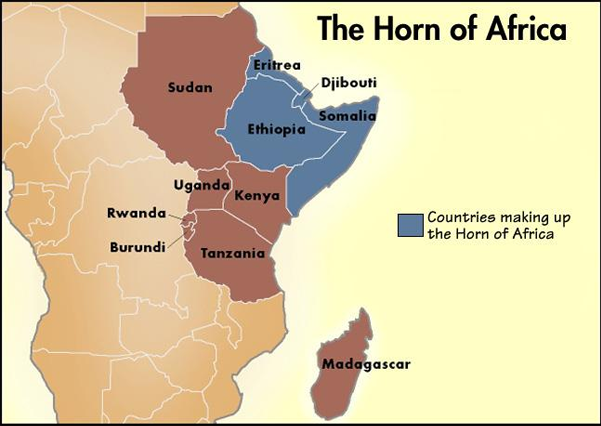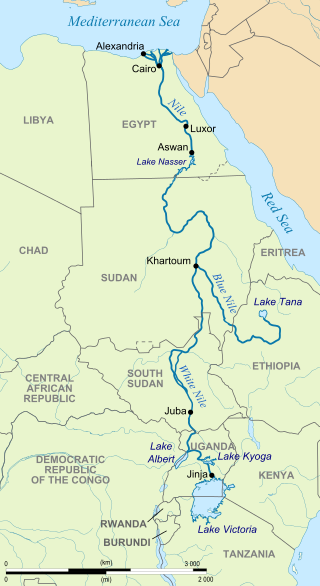Conflict Over Nile | 06 Jan 2021
Why in News
Ethiopia, Sudan and Egypt have recently agreed to resume negotiations to resolve their decade-long complex dispute over the Grand Renaissance Dam hydropower project in the Horn of Africa.
- Horn of Africa is the easternmost extension of African land and includes the region that is home to the countries of Djibouti, Eritrea, Ethiopia, and Somalia, whose cultures have been linked throughout their long history.
- The Grand Renaissance Dam is being constructed by Ethiopia on the river Nile.
Key Points
- Conflict:
- The Nile, Africa’s longest river, has been at the center of a decade-long complex dispute involving several countries that are dependent on the river’s waters.
- Grand Renaissance Dam:
- This 145-meter-tall (475-foot-tall) hydropower project, started by Ethiopia is the cause of conflict.
- Given the dam’s location on the Blue Nile tributary, it would allow Ethiopia to gain control of the flow of the river’s waters.
- Blue Nile is a tributary of the Nile river and it carries about two-thirds of the river's water volume and most of the silt.
- At the forefront of this dispute are Ethiopia, Egypt and Sudan.
- Dam’s Importance for Ethiopia:
- Ethiopia believes this dam will generate approximately 6,000 megawatts of electricity which will support its industrial growth.
- It can also export surplus electricity to neighbouring regions to generate revenue.
- Neighbouring countries like Kenya, Sudan, Eritrea and South Sudan also suffer from electricity shortages and they can also benefit from the hydropower project if Ethiopia decides to sell electricity to them.
- Egypt’s Concern:
- Egypt lies downstream and is concerned that Ethiopia’s control over the water could result in lower water levels within its own borders.
- Egypt depends on the Nile for approximately 97% of its drinking water and irrigation supplies.
- The dam would jeopardise food and water security and livelihoods of ordinary Egyptian citizens.
- Sudan’s Stand:
- Sudan too is concerned that if Ethiopia were to gain control over the river, it would affect the water levels Sudan receives.
- Sudan is likely to benefit from the power generated by the dam.
- The regulated flow of the river will save Sudan from serious flooding in August and September. Thus it has proposed joint management of the dam.
- Current Situation:
- The latest round of talks between Ethiopia, Sudan and Egypt occurred with South Africa observing the proceedings in its role as the current head of the African Union’s rotating council, in addition to other international observers.
- Despite previous talks, the point of contention hasn’t changed.
Nile River
- The River Nile is in Africa. It originates in Burundi, south of the equator, and flows northward through northeastern Africa, eventually flowing through Egypt and finally draining into the Mediterranean Sea.
- Source:
- The source of the Nile is sometimes considered to be Lake Victoria, but the lake itself has feeder rivers of considerable size like the Kagera River.
- The Nile River is considered as one of the longest rivers in the world.
- The Nile has a length of about 6,695 kilometers (4,160 miles).
- The Nile basin is huge and includes parts of Tanzania, Burundi, Rwanda, Congo (Kinshasa), Kenya.
- The Nile River forms an arcuate delta as it empties into the Mediterranean Sea. Deltas with triangular or fan-shape are called arcuate (arc-like) deltas.
- The Nile is formed by three principal streams: the Blue Nile, the Atbara, and the White Nile.
Way Forward
- To solve the conflict peacefully, mediation and facilitation by the neighbouring countries and the international bodies are necessary.
- In case, the attempt to resolve the conflict does not work out by facilitating negotiations between the conflict parties, then a compensation method can be adopted which would need the countries to compensate each others’ losses.
- All countries involved in the issue need to peacefully resolve the issue so that they can reap the advantages of the dam and their peace and security is restored again.


